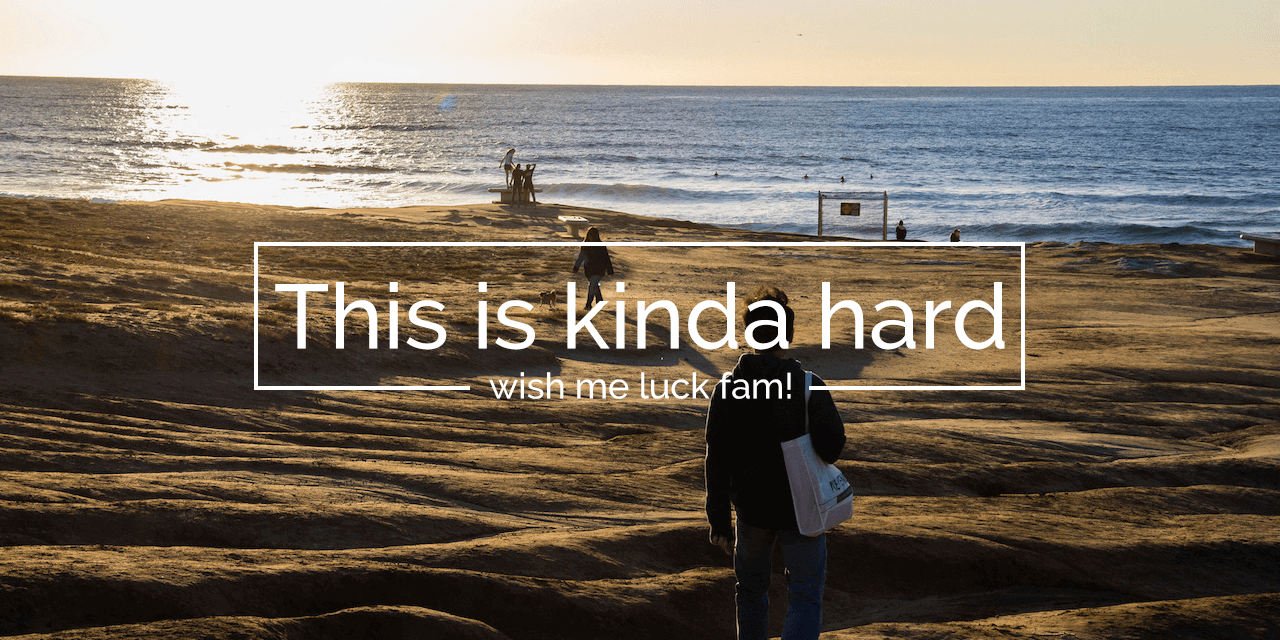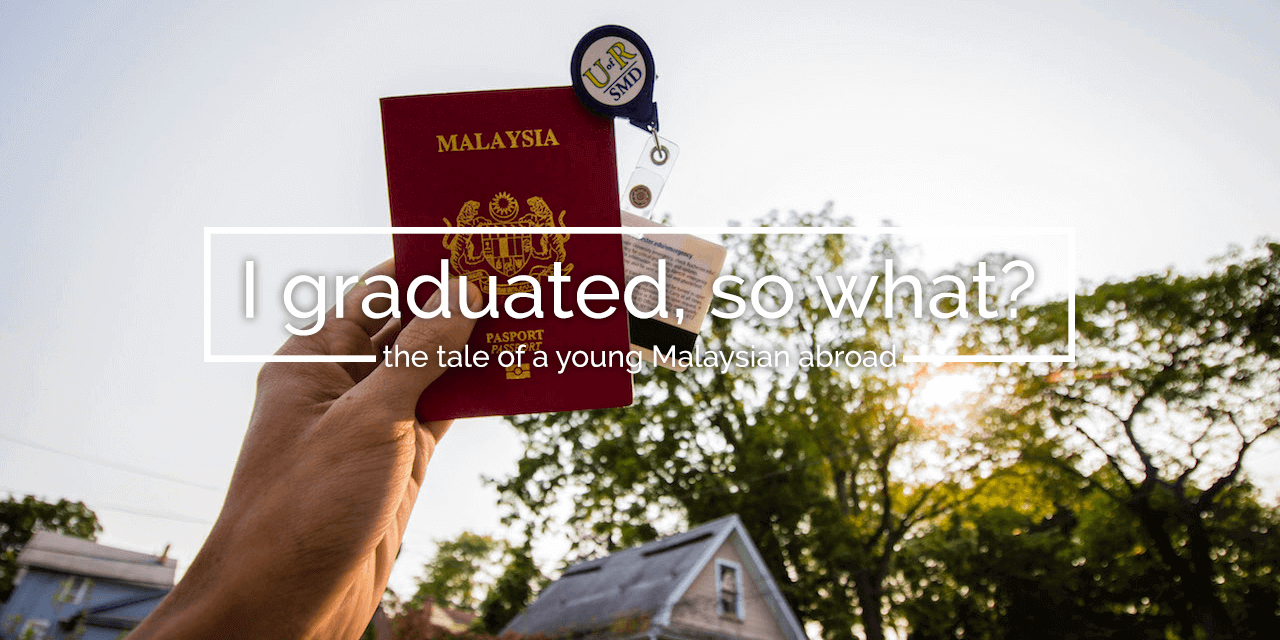
Last month I went to the MARA (my sponsor) headquarter in Kuala Lumpur to notify that I had recently graduated from the Rochester Institute of Technology (RIT) with a Bachelor’s Degree in Biotechnology. It took me a year studying at the INTEC Education College for their foundation program (ADFP) followed by 3.5 years for the undergraduate program RIT.
In December last year (2016), I contemplated the idea of releasing information pertaining to my academic performance. Why? Because of the cost that my government had to cover for my undergraduate education. It was astronomically expensive in MYR term. How much? Well, it was MYR 721,998.83 according to MARA’s online system. This amount is huge. I could buy 2 landed houses and a good car and still have money to spend.
To be clear with everyone reading this story, this money came from Malaysian taxpayers. It doesn’t require skyscraper’s tall of moral value to have a shred of intention to provide some kind of transparency to the Malaysian people. Although some would argue that us, the scholarship recipients, are required to pay back a certain percentage (usually 10%) so we do not have any moral obligations whatsoever, but I would argue at least we need to show we that are worthy of such price tag.
Let’s start with questions we need to answer that came along with MYR 721,998.83 so that we know this investment really did something, if not a dent in the history of humankind. First, how much was being spent on education alone (fees, etc) and how much was spent on my monthly allowance? Second, was the investment on my education well spent on achieving the objectives of being a scholar? Third, aside from the academic achievement, did the investment provided the means for me to be a holistic and well-rounded person to achieve other scholarly and leadership goals? Fourth, was the investment developed me to become an independent and competent individual post-graduation?
Imagine that I am being charged with misappropriating public funds and now I have to defend myself with some evidence. Let’s see how this goes.
Fees and Allowances
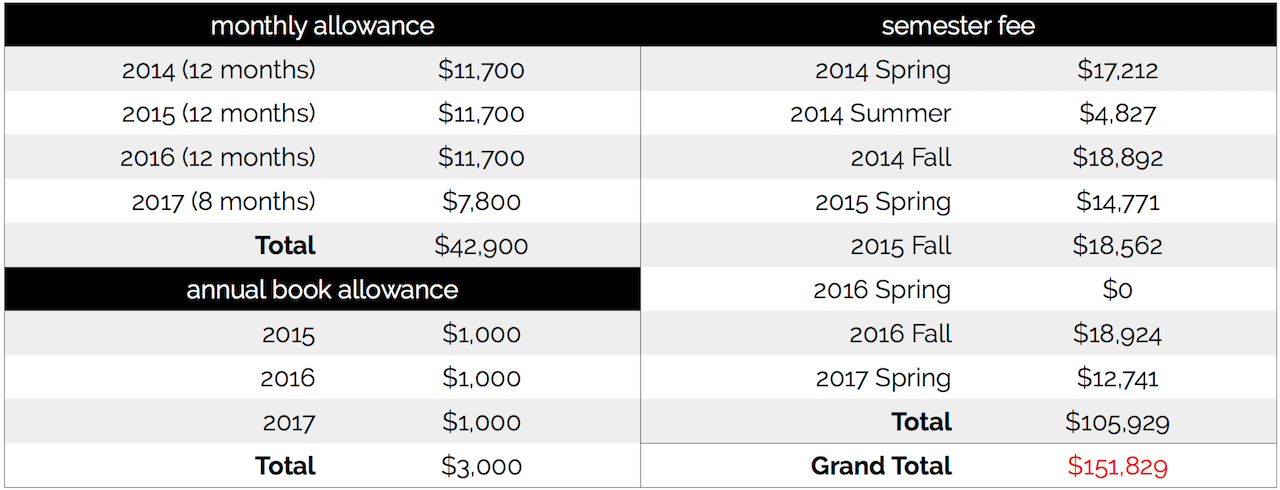
A large chunk of the sponsorship went to the semesters’ tuition fee. I retrieved the figures from the RIT online billing system. What I know here is kind of scratching the surface. There are 2 missing items that I could think of: how much my sponsor paid for my premium health insurance and the cost of travel from Malaysia to the USA. Bear in mind that this cost breakdown does not cover the education that I received at the INTEC Education College, which I believe it was awarded as a full scholarship for the duration of the ADFP program (July 2012 - August 2013). Also please note here that I have no idea why my 2016 spring semester came with $0 tuition fee.
Let’s talk about the monthly allowance. Per MARA/JPA’s designation on the monthly allowance, Malaysian students at RIT receive USD 975 per month (Grade B). In retrospect, USD 975/month is sort of enough but you would live with bare minimum needs and this could be borderline comfortable. Most of us here have (shared) cars, usually we bought old, pre-owned ones. The bad thing is that most pre-owned cars come with certain precautions: they will definitely throw some expensive tantrum. For example, the Chevy Lumina we used almost always went bad once in 2 months with the repair cost being within the range of $400 - $2,000. We were fortunate because 8 of us back then had a shared responsibility to fix it.
There are other unexpected expenses as well. Laptop gone kaput, traveling to attend meetings, moving into a new house, health insurance did not cover certain medical procedures, etc. Thankfully, with the aid of annual book allowance sometimes we redirected it for emergency purposes. Sometimes, we worked part-time jobs on campus. I held 2 jobs that gave a boost around $200 - $300 per month, I lived comfortably without a looming threat of financial instability and an empty tummy.
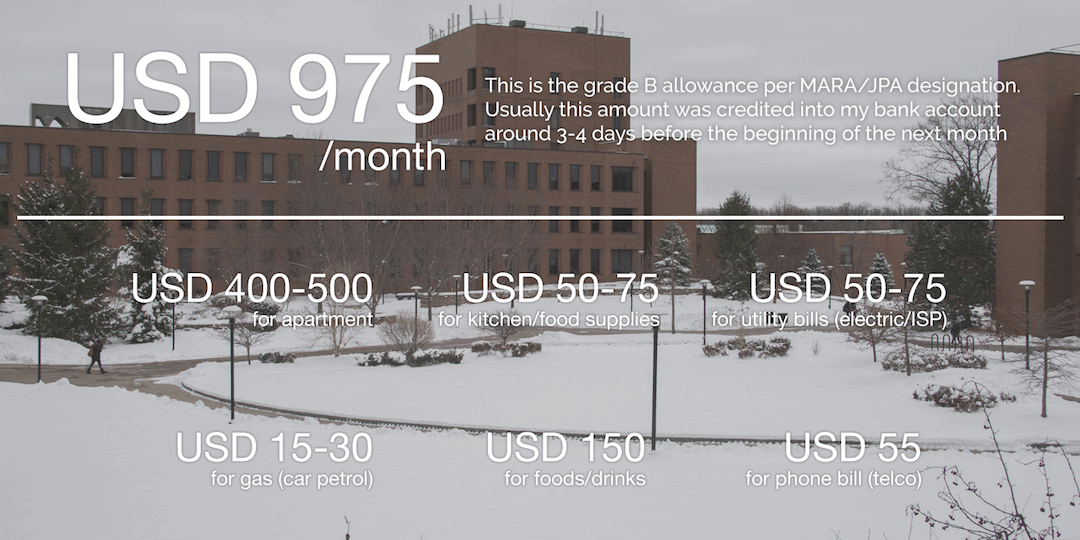
This is a fairly conservative estimate. According to this simple illustration, a Malaysian student living in Rochester could save around $90 per month. This isn’t necessarily true for every month and let’s pick an example: the utility bill. In the summer, we could save up on this but during winter we forked out more money to pay the electricity bill. When it gets really cold outside, the heater must be turned on for 2 reasons: Rochester is freaking cold and you don’t want to die under your thick blanket, and also you don’t want water pipes to get ruptured due to the freezing water.
Some of us really tried to save up but sometimes our circumstances didn’t like to see our saving accounts growing untouched.
Education Objectives
We should call this section “show me your transcript” because it essentially is.
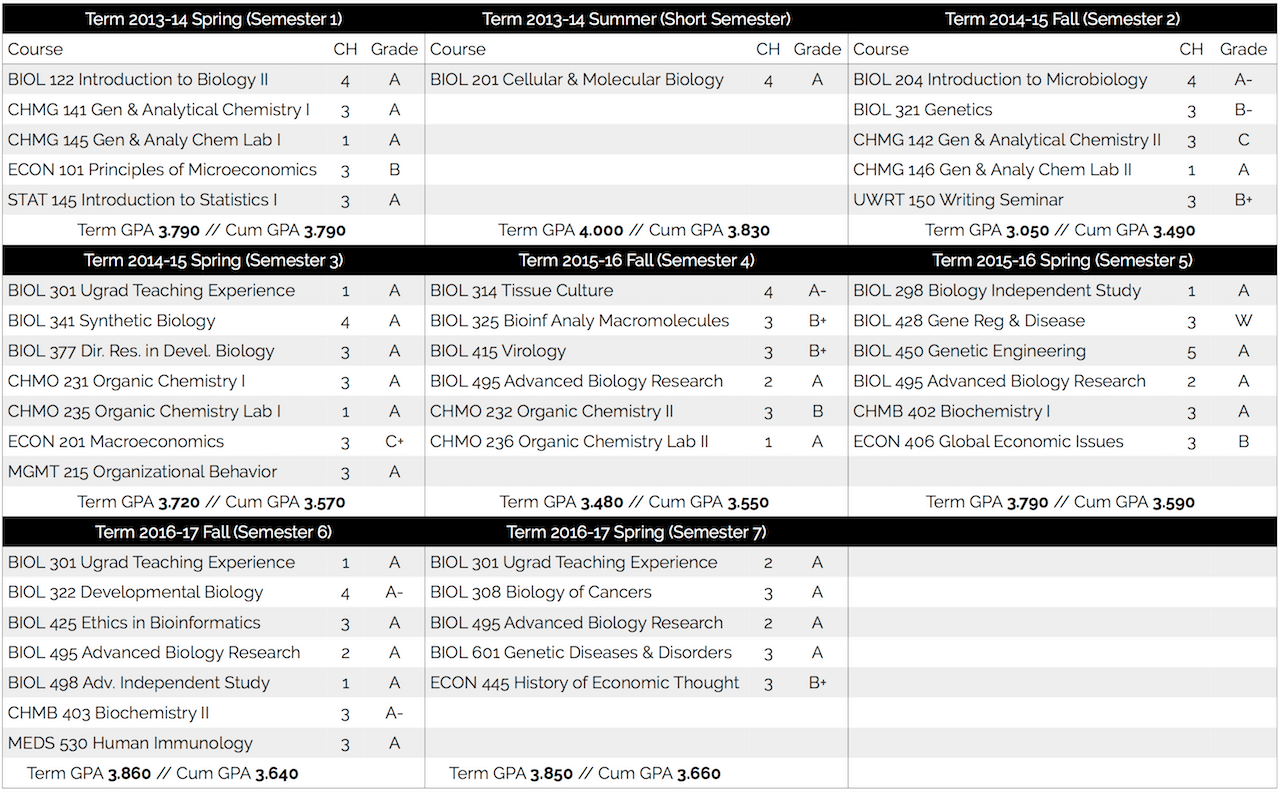
Looking at this transcript, we have to discuss certain peculiarities with regard to the courses I took, why they are some repeating courses, why there is only one short semester, and why I have one “W’ on my transcript.
First, comparing to most students studying for an undergraduate program in the United States, my transcript does not really reflect that fact. Why? Here in the US, we have something that is called the Liberal Arts. A student is expected to complete his/her Liberal Arts requirement, which then means he/she must take certain courses outside his/her field. For example, I should’ve taken a course in each field of psychology, philosophy, history, and language (if I recall correctly).
So why I didn’t?
I came to the RIT as a transfer student, not as a freshman (first-year). That means I transferred a number of courses from INTEC ADFP, which then satisfied my Liberal Arts requirements (wow, thanks INTEC). However, this situation is only applicable if someone is transferring from INTEC ADFP to RIT for biotechnology program in the College of Science. Yes, that specific. I don’t know why, but it worked great. That freed up my time for other biology courses although I regret a bit not being able to be a truly holistic student.
Let’s talk about the summer short semester. I only had one in 2014 and that was for a course called Cell & Molecular Biology. What about the subsequent summer semesters? Well, I took Cell & Molecular Biology in summer 2014 because CM Biology is the prerequisite to most of upper-level biology courses. If you don’t take CM Biology, you can’t advance. I took my chance to stay ahead of time and that worked pretty well. As for the subsequent summer semesters, I chose to do research projects and we will get to this in the next section.
Why there are 3 “Ugrad Teaching Experience” courses? That means I became a teaching assistant (TA). I was offered TA positions for 3 lab courses: Introduction to Microbiology in the spring semester of 2015, Tissue Culture in the fall semester of 2016, and Genetic Engineering in the spring semester of 2017. I thank my professors for allowing me to experience the horror of being an educator although my role was fairly minimal.
Advanced Biology Research and Independent Study also came out more than once on my transcript. This is something interesting that I want to talk about. If you look at my transcript, there is a small dip where my term GPA is 3.05, which brought my CGPA down to 3.49 from 3.83 (semester 2). It was a terrifying moment for me. Fast-forward two semesters later. I learned that a student at RIT could enroll in research courses if he/she could find a professor to be his/her principal investigator (PI). I found a PI at the end of spring semester 2015 and stayed loyal in her lab until I graduated.
One credit hour in a research course translates into 3 hours doing course-related works. In this case, one credit hour means 3 hours running research projects. Knowing that I would prefer doing something to sharpen my technical skills, this was a good trade-off. Then, rather accidentally, I discovered that I could bring my CGPA up again by continuously doing research courses. However, the downside is that I did not have a lot of weekends. But to me, that was fair.
The last but not least, why do I have a “W” on my transcript. W means “withdraw” in the sense that a student drops a class before his/she completes all the course requirements during the course is active in a particular semester. I dropped a course, the Eukaryotic Gene Regulation & Diseases because I screwed up in most of its exams. That class was really interesting (I am not lying) and I liked it so much but I just couldn’t handle the exams. At the risk of another dip, I had to withdraw. If you notice, there is a course called Genetic Engineering in the same semester with 5 credit hours. That was pretty intense. Setting up a semester with both Gene Reg and Genetic Engineering is a solid recipe for disaster.
It is a no-brainer to aim the highest CGPA possible and in fact it came with an incentive. Rumor had it that if a student with MARA sponsorship scored above 3.50, he/she could ask for a lower repayment rate, in this case lower than 10%. I had no way to prove this, but we kind of clung to this rumor anyway. Considering everything, I was grateful graduating with a CGPA of 3.660 and I was awarded an honor, the Magna Cum Laude. It is a fancy way of saying “With Great Distinction”, only second to the Summa Cum Laude.
Extracurricular Scholarly and Leadership Objectives
If the previous section concerns about what is my own my transcript, this section does not bat an eye. So here is a laundry list of things I had accomplished.
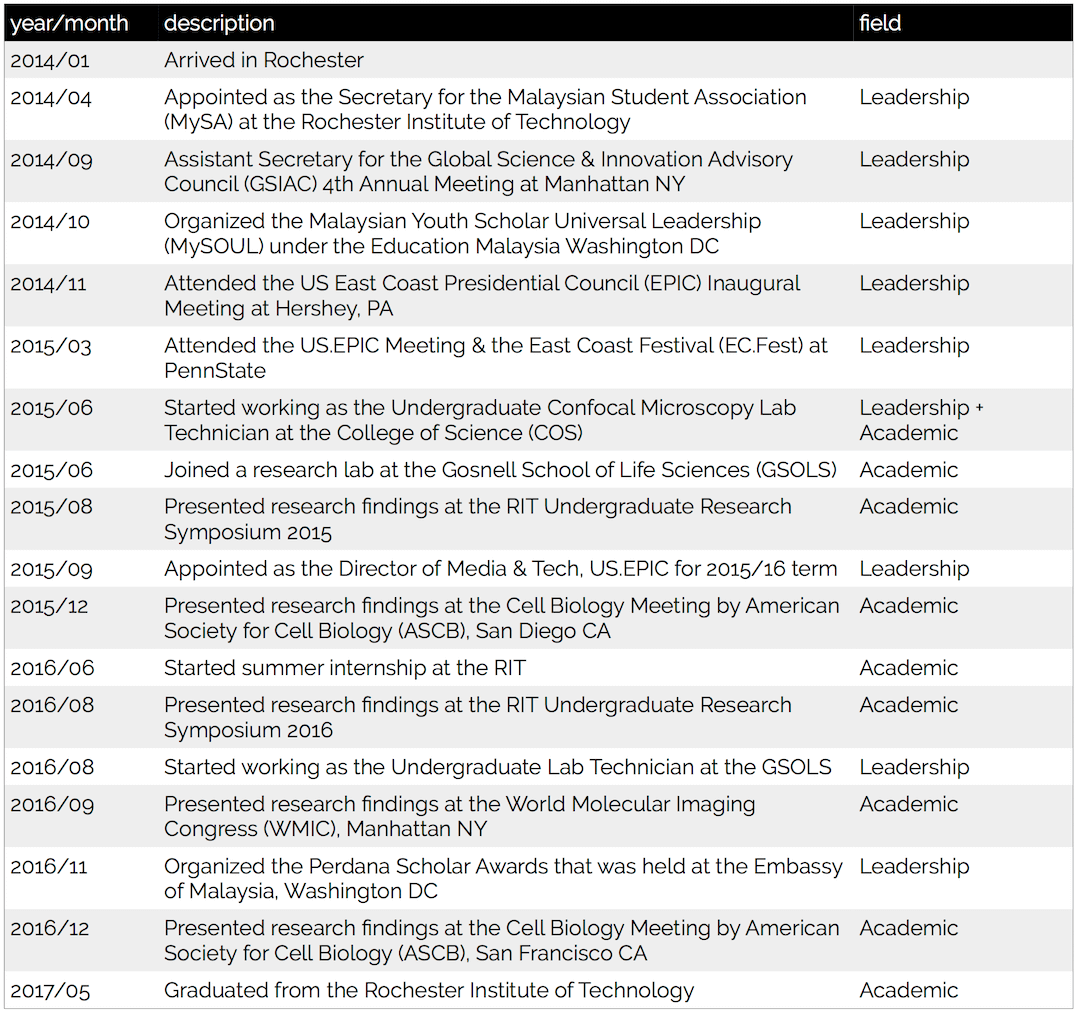
Now, let’s talk about a number of interesting events. Remember the dip I experienced in my second semester? In retrospect, I had a turn from being yet-another-student into a leadership powerhouse for the Malaysian Student Association (MySA) at the RIT. Starting from being elected to hold an office in MySA, I had actively participated in leadership activities that eventually brought me into the Embassy of Malaysia in Washington DC and stayed there until late 2016 (I mean, not quite literally). The dip was well worth it.
The duality of my scholarly-leadership pursuit was beginning to look much more pronounced after I joined a research lab in GSOLS (June 2015). I thank my principal investigator for allowing me to grow cancer cells in the lab and shooting them with high-powered argon and neon lasers, which basically became the defining characteristic of my research projects until I graduated. The research projects eventually brought me to 3 international conferences. My professor played a huge part and I can’t thank her enough for the opportunities. Thanks to her and my awesome lab mates, I attended and presented my research at the Cell Biology Meeting (2015 & 2016) and World Molecular Imaging Conference (2016). I had experienced the lovely impostor syndrome on all three conferences and let’s not talk about this syndrome for the time being.
I want to talk about 2 part-time jobs that I had: undergraduate confocal microscopy technician and undergraduate lab technician. For the past one year and a half (Jan 2014 – May 2015), I had a minimal interaction with my fellow American friends. Such situation was not ideal and was bad concerning my interpersonal development. Realizing that my verbal proficiency hadn’t flown as high as Boeing 777 that brought me into the US, I thought I was in a pretty bad situation. In hindsight, it really was a dire situation.
Forcing myself to run out from my comfort zone, I took these 2 jobs about the same time and thankfully I was offered both. Being a confocal technician, communication between me and research scientists/students was vital for a successful experiment. It forced me to converse more in English especially in a professional setting. Because of these 2 part-time jobs, saying hi and conversing in English is a breeze nowadays, since then it became my second nature.
And let’s talk about two side projects that are not on the list because they are special in their own ways. An applause to Syaza Nazura for having me in her rank and for allowing me rock two gigs with her: the Projek Inspirasi and Radiance21 Scholarship. These two projects defined Nazu’s aim in her life: education for everyone.
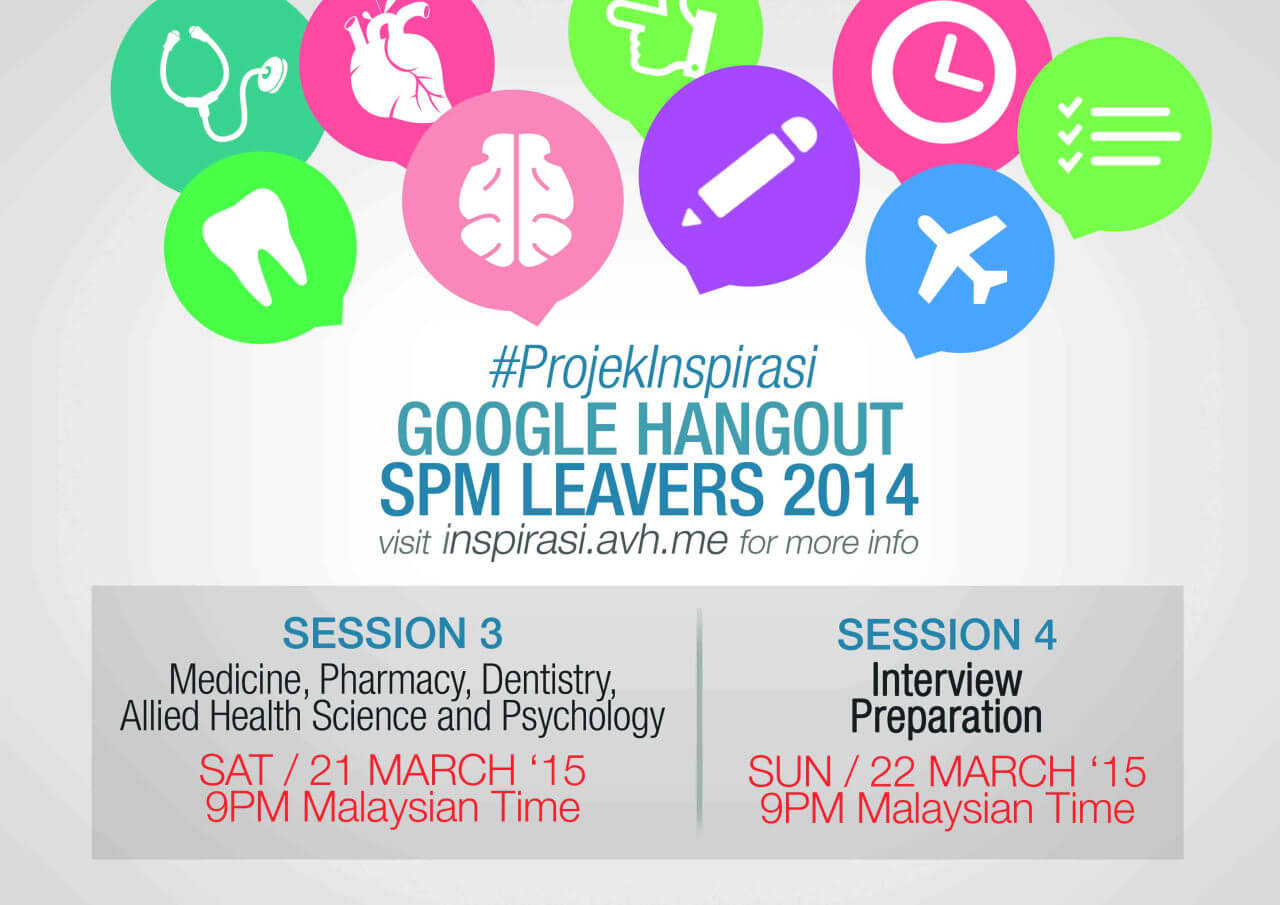
Projek Inspirasi is an educational outreach project with its primary goal to provide information regarding options for tertiary education in Malaysia and abroad. Our main approach was through an online video broadcast by using the Google Hangout, answering questions from aspiring Malaysian students on what the future has to offer. The poster you see above is for 2 sessions we scheduled back in 2014. We were pretty lit back then. Nowadays, we are walking on our own paths. Hopefully, our paths could cross again in the future for Projek Inspirasi (it is not dead, it is hibernating).
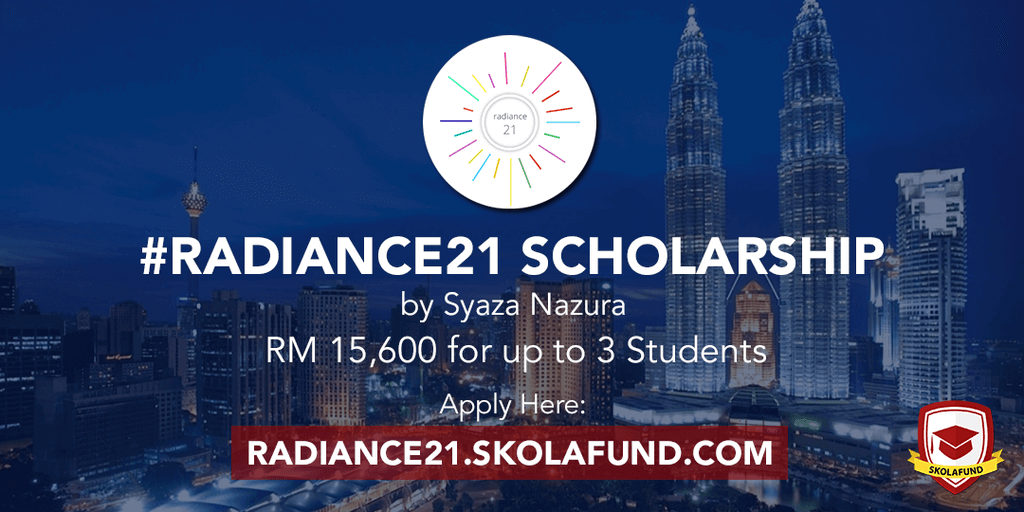
For her 21st birthday (August 2015), Nazu came up with a pretty rad idea. She did not want to receive presents, she wanted to give some. Long story cut short, we did a crowdfunding campaign. Lo and behold, we accrued (no not we, because she mostly did it by herself) MYR 15,600. We teamed up with the Skolafund (a Malaysian education crowdfunding startup) to set up the mechanism to distribute this scholarship. It went well and it was pretty fun. Congratulations to all of the Radiance21’s recipients.
Competency and Proficiency
We have gone through the conservative estimate of living expenses, how well I did on all the courses I took, and also other extracurricular pursuits. Let’s take a step back and contemplate: where all these experiences I gained during my undergraduate days have brought me? Have they molded me to become an independent, competent, and well-prepared for a post-undergraduate life?
And here is a plot twist: I need to wear the graduation cap and gown for another time, hopefully within 5 to 6 years from the day this story goes online. Perhaps what young scholars would perceive as the ultimate academic pursuit is now taking place in my reality. I am now pursuing a doctorate degree (PhD) at the University of Rochester Medical Center (URMC), Rochester NY. I just started late August 2017 (yes, very recently).
Along with eyes staring blankly at me, I am confident I will be asked this question: how come you were able to skip Master’s Degree and go straight to PhD? This is, in fact, a complicated question to answer and thus we need to do some comparative analysis between completing a PhD education in the US versus anywhere else in the world.
First, let’s take a look at the requirements. To be offered a PhD position in the US, it is a common knowledge that you must have a CGPA of 3.30 or better at the time of applying with a substantial record of research experience. In addition to that, there is a very unpopular standardized exam that you have to take, the GRE. Usually, three letters of recommendation are required and must be written by faculty members (professors). Then, you also need to write your statement of purpose which is basically an essay that describes you and it must describe you well. There could be some auxiliary materials depending on which university and program you are applying to.
Anywhere else in the world? Well, you can entirely skip a Master’s Degree but usually you need to have a CGPA of 3.85 or better with a research publication having your name being the first author submitted to a top-tier journal. Yeah, sounds hard but here’s the twist: anywhere else in the world, it is consistent that a PhD takes about 3-4 years, while in the US it takes 5-6 years. There are some other differences but let’s not talk about that today. Let’s celebrate the fact that I have come this far.
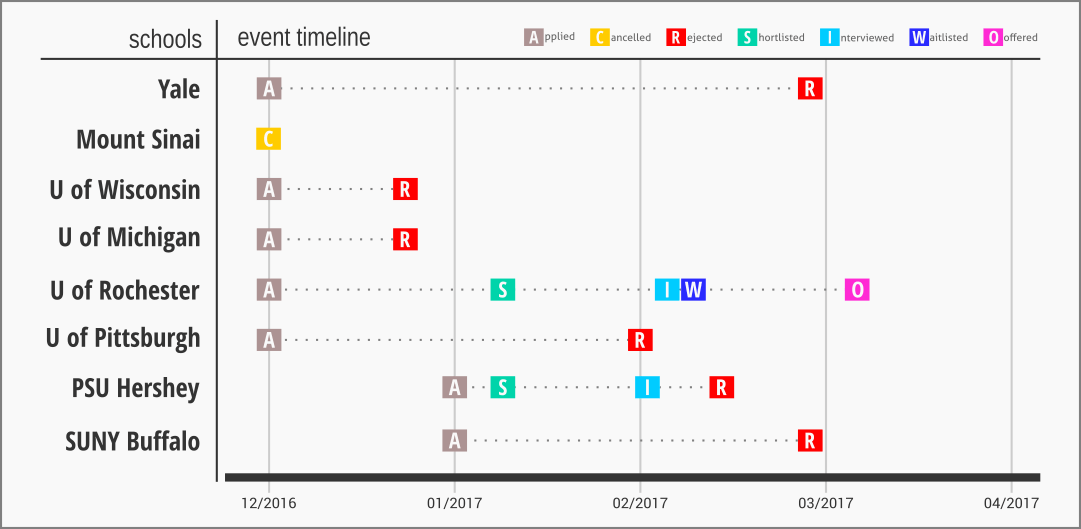
This chart illustrates the gruesome process of applying for PhD programs in the US as far as my experience is concerned. We won’t go too deeply into this but there is one thing I would like to highlight: I was invited for 2 interviews and I faced 6 rejections. URMC waitlisted me for a month before they officially offered me a position in the Department of Microbiology. I applied for their Immunology, Microbiology, and Immunology (IMV) program with concentration in virology track, aiming to become a virologist. Why viruses? They are evil so let’s study them (this is what I told my interviewers, more on this next time).
PhD in the US comes with perks. First, the tuition fee is fully paid for by the university. Health insurance is also fully paid for. On top of these two, I am receiving a generous stipend from the university. Pretty much across the US, the stipend is hovering within the neighborhood of USD 24,000 to USD 36,000 per year depending on the university. It is common sense if Weill Cornell Medicine offers you USD 36,000 because it is in the New York City where living standard is really high.
Future Prospects
This is the last section that also functions as the concluding remark. Let’s spend a little bit of time here reading my opinions and thoughts.
Perhaps you have read my article on lambasting Malaysian students abroad under government scholarship, sharply criticizing our abject complacency. To stitch this point with this story, let’s reiterate the primary theme of this story: I got a huge price tag on my education abroad and taxpayers were funding it. Although I know we (MARA) students have to pay a certain small percentage and JPA students have to abide by their contract to serve in Malaysia for 10 years (if I recall correctly), the amount of funding given to us compared to the what we have to do to satisfy the contract is disproportionate. At the very least, we the students under government scholarship should be held accountable and should provide some degree of transparency.
One would argue that as long as we satisfy our contract and academic requirements, we don’t have to feel obligated to take an extra mile. Well, I would argue otherwise. If the taxpayers’ money is being spent on infrastructure, we expect it to serve the public in its best form for our collective benefit. To me, it is like an oversight to let us not being accountable for the amount of money we have been trusted with. Hence, I would like to introduce you a concept that I firmly believed in: the intellectual debt.
There is an unspoken requirement attached to our sponsorship that we have to honor as well. This is the intellectual debt that we owe to the Malaysian people. We are being sent abroad to be the intellectuals, the residence of intelligentsia. Less than 40% of young Malaysian are pursuing tertiary educations, even a smaller percentage being sent abroad for an undergraduate program. It is common sense to think that we need to take an extra mile.
How so? We provide intellectual benefits to our fellow citizen. We should strive to be the face of intellectuals to educate our fellow friends. We have so many outlets nowadays to share and guide our friends. If we stay silent and unhinged from the reality, we are not worth the investment. Much of what I disagree is the display of luxurious lifestyle in contrast to showing some craftsmanship to our friends in Malaysia.
I do not want to be presumptuous by saying I did the best and my accomplishments set a new bar. It just does not feel that I did something cool that Malaysians should be proud of. I am still kind of someone-in-progress. To be honest with everyone here, I wake up every day with flashes of bleak prospect ahead of me (this is true, I am not kidding) and slight tremor manifests sometimes thinking about what must I do next, should I be held accountable misappropriating public funds only for my selfish needs. Although this sounds like a long shot, I hope my fellow Malaysian don’t mind if I asked you to look me up as an inspiration because knowing that I am being observed makes me feel I should be held accountable for my actions.
Last but not least, if this story strikes you like I am showing off, let me reiterate my point: this story is in the interest of transparency and for educational purpose. If you think I am showing off, you are not my target group.
FYI, comment section tends to gyrate into being a cesspool of insanity so I don’t have one here. If you have any comments, criticisms, feedbacks or whatsoever, reach me on Twitter (@aixnr) or shoot me an email at aixnr256 [at] gmail [dot] com.
Last but not least, the journey to complete a PhD program is a well-known struggle. Wish me luck!
